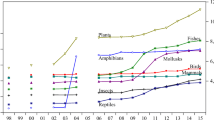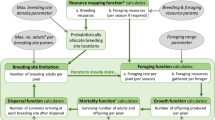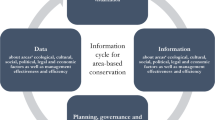Abstract
Policy action to halt the global loss of biodiversity and ecosystems is hindered by the perception that it would be so costly as to compromise economic development, yet this assumption needs testing. Inspired by the recent Stern Review on the Economics of Climate Change, the leaders of the G8+5 nations commissioned a similar assessment of the economics of losing biodiversity, under the Potsdam Initiative on Biodiversity. Here, we propose a conceptual framework for such a global assessment which emphasizes several critical insights from the environmental economics and valuation literature: contrasting counterfactual scenarios which differ solely in whether they include specific conservation policies; identifying non-overlapping benefits; modeling the production, flow, use and value of benefits in a spatially-explicit way; and incorporating the likely costs as well as possible benefits of policy interventions. Tackling these challenges, we argue, will significantly enhance our ability to quantify how the loss of benefits derived from ecosystems and biodiversity compares with the costs incurred in retaining them. We also summarise a review of the current state of knowledge, in order to assess how quickly this framework could be operationalized for some key ecosystem services.
Similar content being viewed by others
References
Alder J, Guénette S et al (2007) Ecosystem-based global fishing policy scenarios research reports. Fish Centre, UK
Balmford A, Bruner A et al (2002) Ecology—economic reasons for conserving wild nature. Science 297(5583): 950–953
Balmford A, Rodrigues ASL et al (2008) The Economics of Biodiversity and Ecosystems: Scoping the Science. European Commission (contract: ENV/070307/2007/486089/ETU/B2), Cambridge UK. Available: http://ec.europa.eu/environment/nature/biodiversity/economics/teeb_en.htm. Accessed 10 June 2009
Bateman I, Munro A, Rhodes B, Starmer C, Sugden R (1997) A test of the theory of reference-dependent preferences. Q J Econ 112: 479–505
Bateman IJ, Mace GM, Fezzi C, Atkinson G, Turner RK (2010) Economic Analysis for Ecosystem Service Assessments. Environ Resour Econ. doi:10.1007/s10640-010-9418-x
Bateman IJ, Munro A, Poe GL (2008) Decoy effects in choice experiments and contingent valuation: asymmetric dominance. Land Econ 84:115–127
Biggs R, Raudsepp-Hearne C et al (2007) Linking futures across scales: a dialog on multiscale scenarios. Ecol Soc 12(1): 17
Bockstael NE, Freeman AM, Kopp RJ, Portney PR, Smith VK (2000) On measuring economic values for nature. Environ Sci Technol 34: 1384–1389
Boyd J, Banzhaf S (2007) What are ecosystem services? The need for standardized environmental accounting units. Ecol Econ 63(2–3): 616–626
Bruner A, Naidoo R et al (2008) Review of the costs of conservation and priorities for action. Cambridge European Commission (contract: ENV/070307/2007/486089/ETU/B2). Available: http://ec.europa.eu/environment/nature/biodiversity/economics/teeb_en.htm. Accessed 10 June 2009
Costanza R, dArge R et al (1997) The value of the world’s ecosystem services and natural capital. Nature 387(6630): 253–260
Daily G (1997) Nature’s services: societal dependence on natural ecosystems. Island Press, Washington
de Groot RS, Wilson MA et al (2002) A typology for the classification, description and valuation of ecosystem functions, goods and services. Ecol Econ 41(3): 393–408
Fisher B, Turner RK (2008) Ecosystem services: classification for valuation. Biol Conserv 141(5): 1167–1169
Fisher B, Turner RK et al (2009) Defining and classifying ecosystem services for decision making. Ecol Econ 68(3): 643–653
Folke C, Carpenter S et al (2004) Regime shifts, resilience, and biodiversity in ecosystem management. Ann Rev Ecol Evol S35: 557–581
Gowdy JM, Mayumi K (2001) Reformulating the foundations of consumer choice theory and environmental valuation. Ecol Econ 39: 223–237
Gowdy J, Erickson J (2005) Ecological economics at a crossroads. Ecol Econ 53: 17–20
IPCC (2007) Climate change 2007: synthesis report. Geneva, Switzerland Potsdam Initiative (2007) Available: http://ec.europa.eu/research/iscp/pdf/2007-03-18-potsdamer-erklaerung-enbiodiv17_marz2007.pdf. Accessed 10 June 2009
Kahneman D (1986) Comments. Valuing environmental goods: an assessment of contingent valuation methods. Rowman and Allanheld, Totowa, pp 185–197
Kindermann G, Obersteiner M et al (2008) Global cost estimates of reducing carbon emissions through avoided deforestation. Proc Natl Acad Sci USA 105(30): 10302–10307
Kok K, Biggs R et al (2007) Methods for developing multiscale participatory scenarios: insights from southern Africa and Europe. Ecol Soc 12(1): 8
Laycock H, Moran D, Smart J, Raffaelli D, White P (2009) Evaluating the cost-effectiveness of conservation: the UK biodiversity action plan. Biol Conserv 142: 3120–3127
MA (2005) Millennium ecosystem assessment: ecosystems and human well-being: synthesis report. Island Press, New York
MacMillan D, Hanley N, Lienhoop N (2006) Contingent valuation: environmental polling or preference engine?. Ecol Econ 60: 299–307
Miles L, Kapos V (2008) Reducing greenhouse gas emissions from deforestation and forest degradation: global land-use implications. Science 320(5882): 1454–1455
Naidoo R, Ricketts TH (2006) Mapping the economic costs and benefits of conservation. Plos Biol 4(11): 2153–2164
Naidoo R, Iwamura T (2007) Global-scale mapping of economic benefits from agricultural lands: implications for conservation priorities. Biol Conserv 140(1–2): 40–49
Norgaard RB, Bode C, Grp VR (1998) Next, the value of God, and other reactions. Ecol Econ 25: 37–39
Polasky S, Camm JD, Garber-Yonts B (2001) Selecting biological reserves cost-effectively: an application to terrestrial vertebrate conservation in Oregon. Land Econ 77: 68–78
Polasky S, Nelson E, Camm J, Csuti B, Fackler P, Lonsdorf E, Montgomery C, White D, Arthur J, Garber-Yonts B, Haight R, Kagan J, Starfield A, Tobalske C (2008) Where to put things? Spatial land management to sustain biodiversity and economic returns. Biol Conserv 141: 1505–1524
Polasky S, Nelson E, Pennington D, Johnson KA (2010) The impact of land-use change on ecosystem services, biodiversity and returns to landowners: a case study in the State of Minnesota. Environ Resour Econ. doi:10.1007/s10640-010-9407-0
Ricketts TH, Daily GC, Ehrlich PR, Michener CD (2004) Economic value of tropical forest to coffee production. Proc Natl Acadf Sci USA 101: 12579–12582
Srinivasan UT, Carey SP, Hallstein E, Higgins PAT, Kerr AC, Koteen LE, Smith AB, Watson R, Harte J, Norgaard RB (2008) The debt of nations and the distribution of ecological impacts from human activities. Proc Natl Acad Sci USA 105: 1768–1773
Stern N (2007) The economics of climate change: the Stern review. Cambridge University Press, Cambridge
Stern N, Taylor C (2007) Climate change: risk, ethics, and the Stern review. Science 317(5835): 203–204
Turner R (1999) The place of economic values in environmental valuation valuing environmental preferences: theory and practice of the contingent valuation method in the US. In: Bateman IJ, Willis KG (eds) EU and developing countries. Oxford University Press, Oxford, pp 17–41
Turner RK (2007) Limits to CBA in UK and European environmental policy: retrospects and future prospects. Environ Resour Econ 37: 253–269
Turner RK (2010) A pluralistic approach to ecosystem services evaluation. CSERGE Working Paper, Series 2010
Vatn A, Bromley DW (1994) Choices without prices without apologies. J Environ Econ Manag 26: 129–148
World Bank FAO (2008) The Sunken Billions: The Economic Justification for Fisheries Reform. The International Bank for Reconstruction and Development/The World Bank. Available: http://siteresources.worldbank.org/EXTARD/Resources/336681-1215724937571/SunkenBillionsAdvanceWebEd.pdf. Accessed 9 Oct 2008. The World Bank, Food and Agriculture Organization, Washington D.C.
Worm B, Barbier EB et al (2006) Impacts of biodiversity loss on ocean ecosystem services. Science 314(5800): 787–790
Author information
Authors and Affiliations
Corresponding author
Additional information
Andrew Balmford, Brendan Fisher, and Ana S.L. Rodrigues have contributed equally to this manuscript.
Electronic Supplementary Material
The Below is the Electronic Supplementary Material.
Rights and permissions
About this article
Cite this article
Balmford, A., Fisher, B., Green, R.E. et al. Bringing Ecosystem Services into the Real World: An Operational Framework for Assessing the Economic Consequences of Losing Wild Nature. Environ Resource Econ 48, 161–175 (2011). https://doi.org/10.1007/s10640-010-9413-2
Accepted:
Published:
Issue Date:
DOI: https://doi.org/10.1007/s10640-010-9413-2




